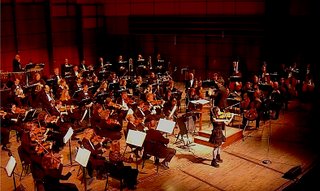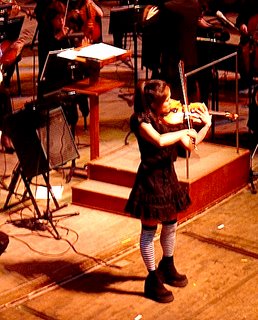|
|

6/24/2006
WORKING WITHIN THE SYSTEM
 Last month I had a contrary experience. I participated in everything I've blogged about, and against ... orchestras, new music, NPR, Clear Channel, pops concerts, stars and live performances ... Last month I had a contrary experience. I participated in everything I've blogged about, and against ... orchestras, new music, NPR, Clear Channel, pops concerts, stars and live performances ...
What did I do? I "appeared" (you know, Itzhak Perlman, Gidon Kremer, Vanessa Mae ... those types) with the Grand Rapids Symphony Orchestra (GRSO), on a pops concert! I took part in 3 live performances of the final movement of Philip Glass's Violin Concerto and John Williams's Two Pieces from Schindler's List in front of an orchestra, not within it.
It was the first time Philip Glass had ever been programmed by the GRSO. For well over a decade I've lobbied the GRSO to program a Philip Glass piece. I don't know why conductors, orchestra managements and others in the American orchestra world are so reticent about programming Philip Glass. Practically everyone in the classical music world thinks they know a lot about his music and most have dismissed it altogether. Over the years I've conversed with many of these "knowledgeable" people only to find most have never heard any of Glass's orchestral music. Many "professional musicians" have dismissed these recent works due to opinions formed 20-30 years ago. This type of attitude is illogical. Things change, people change and tastes change. Imagine if you lived every aspect of your life, based on opinions formed 2 or 3 decades ago. Sometimes I think the state of American arts organizations, and orchestras in particular, are a lot like Israelis and Palestinians. They just can't seem to move ahead.
About a year ago, GRSO Associate Conductor John Varineau approached me about soloing on a pops concert. One of the most frustrating things about being an orchestral player is the absolute lack of influence on programming, even if one sits on the orchestra's programming committee. Soloists, on the other hand, can have a big role in terms of the repertoire they choose to perform. It's again unfortunate that most of the big name soloists (some mentioned above) and their managers choose to be unadventurous. More on this later.
I would have much rather seen performed, as the GRSO's inaugural Glass piece, one of his symphonies, but then again I would have rather not seen Bush II inaugurated once, let alone twice. Clearly, there are lots of things we would rather see happen in this life that we have no control over. So, when the possibility of programming a Glass piece came along it just so happened I would have to be the soloist. Fortunately, John Varineau was open to the idea, so long as I agreed to play something "really popular" as well ... thus John Williams. And I must admit, I actually enjoyed performing "Schindler's List".
 A bit about the concert. It was billed as "Stars of the Symphony" which is really a euphemism for "members of the Grand Rapids Symphony". Quite honestly, even most of our regular patrons don't know us from Adam, and this is true for most orchestras. This is the nature of being an orchestral musician, versus being a "star". In many ways, it is unfortunate there are so many "stars" in the classical music world. These overpriced prima donnas (not only singers, in this instance) are the cause of so many orchestras going bust and a stagnant mass-market recording industry. More on that later. A bit about the concert. It was billed as "Stars of the Symphony" which is really a euphemism for "members of the Grand Rapids Symphony". Quite honestly, even most of our regular patrons don't know us from Adam, and this is true for most orchestras. This is the nature of being an orchestral musician, versus being a "star". In many ways, it is unfortunate there are so many "stars" in the classical music world. These overpriced prima donnas (not only singers, in this instance) are the cause of so many orchestras going bust and a stagnant mass-market recording industry. More on that later.
So how does one go about marketing "stars" who are not really "stars?" I believe if the performers are not really "stars" then the music itself, or even certain composers, must function as "stars." On the surface, an orchestral pops series would seem an unlikely place to program a piece by Philip Glass. We are taught the most conservative (and rudely vocal) listeners subscribe to pops concerts; if it's new, if it's different, they'll hate it. At one point, we were also taught the world was flat. Although Philip Glass is not yet a household name like John Williams, he is, by classical music standards, extremely popular. A few years ago there was even a mocking of his character, name and music on "South Park". Let's face it, in order to be mocked in popular culture, one needs to be "popular." After the concerts, many audience members and musicians commented to me and others that the Glass piece was noticeably the most well-received work on the program. Needless to say conventional wisdom, once again, proved to be a whole lot of bull.
In addition to innovative programming, the marketing staff at the GRSO arranged for us to co-produce (writing voice overs and choosing background music) public service announcements (audio PSAs) for area National Public Radio and Clear Channel affiliates (most of the stations in our area). For about 2 weeks, whether a news, classical, top-40 or country music listener, West Michigan radio listeners heard my voice (along with 2 other "stars") plugging the concert. You can listen to my two PSAs here and here. This personal marketing approach (come here me play!) is something "stars" like Kathy Battle or Luciano Pavarotti will not "lower" themselves to do, without an even heftier (pun intended) fee.
What can I say? All this extra effort to get Philip Glass, the most popular composer of our time, programmed for the 1st time by an American orchestra ... I guess this is working within the system. But, is working within the system compromising? After all, a Glass piece is more appropriate for a classical series, not pops; I performed John Williams; I went on Clear Channel; yada; yada; yada. Since I would have much rather not done some of these things ... YES ... working within the system is compromising, but I can honestly say I was not compromising THE art, the MUSIC. I was compromising FOR the art/music. As much as I detest corporate culture's influence on art, the reality is that we live in Bush's America. But, no matter what the culture, time or situation arts organizations find themselves in, their job is to present, not compromise, art. American orchestras, large and small, should be programming this music. American musicians, conservative or progressive, can be actively endorsing it, and the American media, commercial or public, should be supporting it.
posted by Christina Fong
2:03 PM
|
| |



